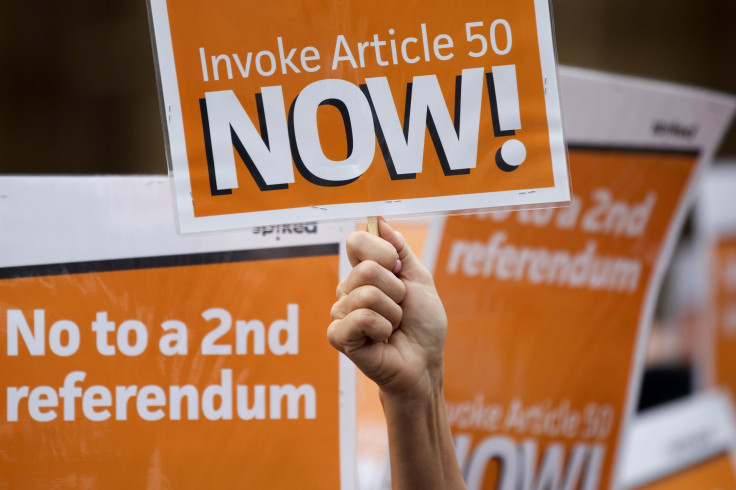Brexit Article 50: Theresa May Offers Lawmakers Scrutiny Of Process

British Prime Minister Theresa May has agreed to demands for parliament to debate the government's plans to leave the European Union, but ruled out letting it vote on whether to trigger the formal Brexit procedure.
Late on Tuesday, May moved to appease some lawmakers in her ruling Conservative Party by allowing a motion proposed by the opposition Labour Party for a "full and transparent debate" on how the government will enact the public vote to leave the EU.
The move spurred sterling, which has fallen 18 percent against the dollar since the June referendum, with investors concerned Britain is heading for a so-called "hard Brexit", or a clean break from the bloc's lucrative single market of 500 million consumers in order to control immigration.
But May, under pressure from Labour and other lawmakers to offer them more than her catchphrase of "Brexit means Brexit", stopped short of promising a formal vote on her strategy before triggering Article 50 of the EU's Lisbon Treaty.
"We've always said that parliament has an important role to play, and the amendment reflects that," May's spokeswoman said on Wednesday morning.
"But we also believe this should be done in a way that respects the decision of the people of the UK when they voted to leave the EU on 23 June and does not undermine the negotiating position of the government."
"There will not be a vote on triggering Article 50."
Sterling trimmed some of its gains on Wednesday after that statement.
Appointed prime minister shortly after the referendum on EU membership, May has come under pressure to break with her policy of refusing to give a "running commentary" from not only opposition lawmakers but from members of her own party.
They say by refusing to debate her strategy May is undermining Britain's centuries-old democracy. The prime minister says she does not want to show her hand before starting some of the most complex negotiations London has ever undertaken.
"I and many others did not exercise our vote in the referendum so as to restore the sovereignty of this parliament only to see what we regarded as the tyranny of the European Union replaced by that of a government," Stephen Phillips, a Conservative lawmaker who voted to leave, told the Guardian newspaper.
INVESTORS JUMPY
The Labour lawmakers' motion called for a full debate on the government's plan to leave the EU and demanded the chamber be "able properly to scrutinize that plan for leaving the EU before Article 50 is invoked".
May accepted the motion with conditions via an amendment, under her name, posted on the parliament website. In it, the government said: "The process should be undertaken in such a way that respects the decision of the people of the UK when they voted to leave the EU."
Any scrutiny must "not undermine the negotiating position of the Government as negotiations are entered into which will take place after Article 50 has been triggered".
May has defended her "prerogative" to trigger the divorce without parliamentary approval and her government will defend that position at London's High Court on Thursday, when a legal challenge led by a pro-EU investment fund manager will begin.
The former interior minister has given little away on her negotiating strategy, signaling that she wanted to return sovereignty to Britain, reduce immigration but also have the best possible deal for businesses and trade.
Investors fear that with three leading Brexit campaigners among her closest advisers, May is taking Britain toward a "hard Brexit". On Tuesday, several top bankers said they could start moving staff abroad as early as next year if there was no clarity on access to the single market.
Trying to calm markets, May's aides say the prime minister has not ruled out winning access to the single market and sources close to her indicate that the government still has a long way to go before coming up with a clear stance.
"There are no leaks, because there is nothing to leak," an aide said last week.
© Copyright Thomson Reuters 2024. All rights reserved.











